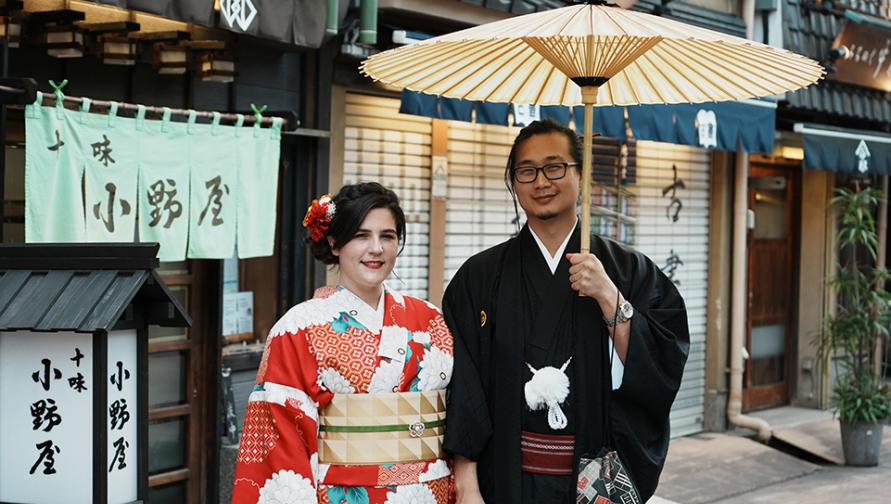
The UCI Humanities Center is excited to feature Alexandra Yan, a doctoral candidate in modern Japanese literature and comparative literature, who traveled to Japan to conduct research for her dissertation with a Fulbright-Hays Doctoral Dissertation Research Abroad fellowship. She has since returned to UCI, where she is completing her dissertation, preparing manuscripts for publication, and anticipating the next chapter of her life.
Briefly describe your research project.
“Between the 1860s and 1945, the Japanese Empire colonized several nearby territories, among which were Korea and Taiwan. My research addresses novels and short stories written in Japanese by colonized Korean and Taiwanese authors during this period, but particularly in the 1930s and 40s as fascism was on the rise. These authors were considered collaborators in the postwar era for a number of reasons, chief among which was the fact that they wrote in Japanese. Instead of looking at them through the lens of the Cold War and the postwar politics of the specific nation-states of South Korea, North Korea, and Taiwan, my research re-situates this body of texts in the historical context of its origin. In doing so, I elucidate the ways in which these authors drew on multiple, sometimes contradictory sources of inspiration and employed multifarious writing practices to persist through the tremendous dangers and pressures of writing under the Japanese Empire. Literature was not just a means of entertainment or employment for them, but rather a method of re-locating the terrain of imperial debate in their own favor and staying engaged with their audience despite increasing censorship and constraint. All of these novels and short stories address their major social and artistic concerns through creative fictional tools like doublespeak, multi-layered meaning, multilingualism, and the use of historical or fantastical narratives to talk about contemporary realities, to name a few.”
What did you do as research for your dissertation in Japan?
“While I was in Tokyo, I spent a lot of time just writing my dissertation! When I wasn’t doing that, I was digging around in different Japanese libraries looking for materials to incorporate into my chapters. I also attended lots of Japanese conferences, reading groups, and research meetings, and took some classes with Japanese professors. It was especially helpful to get feedback on my writing from the Japanese grad students and professors I met.”
What was something especially intriguing or surprising that you learned while you were conducting research in Japan?
“I learned a lot of interesting things, but one in particular was about one of my authors Ch’oe Chŏng-hŭi. She wrote both a Korean language and a Japanese language version of her short story “House of Roses” (1942), which were the same in terms of plot but very different in some key ways. I had been wondering why for a long time! It turns out that the Korean version was actually the text of a radio drama with the same plot as her original Japanese version. At the time, it was very difficult to publish any literature in Korean, but Korean language radio dramas were still airing, and this fact meant Ch’oe had space to include both more details and a number of satirical elements that didn’t appear in the Japanese version in her Korean language narrative.”
What are the next steps now that you are back at UCI?
“Now that I’m back at UCI, I’m going to continue writing my dissertation, preparing manuscripts for publication, and then next fall, I’ll go on the job market. Right now, I’m also taking Chinese here at UCI so I can better engage with the literary context and secondary sources surrounding the Taiwanese authors I’m writing about. While Japanese is my primary research language, the set of authors I work with is very multilingual and so is the body of secondary literature surrounding them.”
Tell us about a fun experience you had in Japan during this stay.
“I had a lot more fun than I expected being in Japan this time. In February, my husband and I were in Hokkaido, the northernmost island of Japan, and so we decided to take a short trip to see endangered red-capped cranes in Kushiro. It was extremely cold and everything was covered in snow, but it was totally worth it to see the bonded pairs of cranes dancing and doing their characteristic screeching together. The Japanese Ministry of Environment has designated this hilarious but also very beautiful sound as one of its “One Hundred Soundscapes of Japan,” i.e. a soundscape that is both culturally and historically representative of Japan but also in need of protection in the face of climate change and habitat destruction.”
Written by Tommy Cross, Fall 2023 English Intern, Humanities Center
